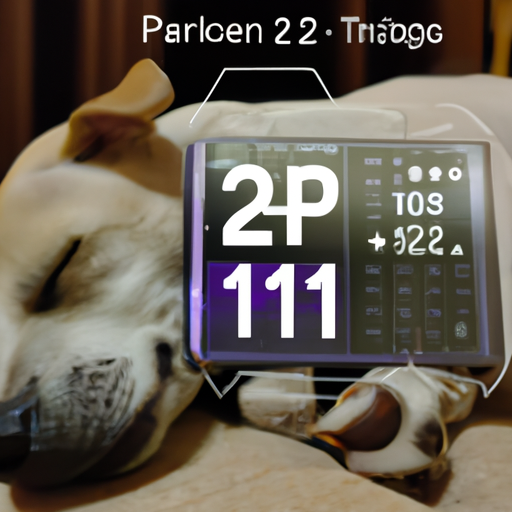As a dog owner, you may have noticed your furry friend snoozing off in the middle of the day or dozing off during what seems like every car ride. Have you ever wondered just how much sleep your dog really needs? Surprisingly, our canine companions need a lot more sleep than we humans do. Let’s delve into the details of a dog’s sleep schedule and understand how many hours dogs sleep in 24 hours.
- Understanding a Dog’s Sleep Schedule
- Factors That Influence a Dog’s Sleep
- Monitoring Your Dog’s Sleep
- Helping Your Dog Get Quality Sleep
- FAQs
Understanding a Dog’s Sleep Schedule
According to American Kennel Club, dogs spend about 50% of their day sleeping – that’s roughly 12 to 14 hours in a 24-hour period. This might seem like a lot, especially when compared to a human’s average of 7 to 9 hours. However, unlike humans, dogs are flexible sleepers. They have the ability to adjust their sleep pattern based on their activities and their environment.
The remaining 50% of their day is divided between 30% awake and alert, and 20% relaxing or drifting in and out of sleep. If you’ve ever noticed your dog’s eyes flickering during their nap, they might be in this state of light sleep.
Puppies and older dogs require even more sleep, sometimes up to 18-20 hours a day. Much like human babies, puppies expend a lot of energy growing and exploring their new world. Older dogs, on the other hand, tend to tire easily and need more rest to conserve energy.
In addition to the amount of sleep, the type of sleep dogs experience is also important. Dogs, like humans, have sleep cycles that include stages of Rapid Eye Movement (REM) sleep, which is when dreaming occurs. You can read more about these fascinating canine sleep patterns at OneTopDog.
Factors That Influence a Dog’s Sleep
Several factors can influence how much sleep a dog needs. These include:
- Age: As mentioned earlier, puppies and older dogs need more sleep.
- Breed: Larger breeds tend to sleep more than smaller ones.
- Activity Level: Working dogs or highly active dogs may require less sleep due to their busy schedules.
- Health: Illness or certain medications can cause a dog to sleep more or less than usual.
Check out this comprehensive guide on OneTopDog to understand how different breeds have different sleep requirements.
Monitoring Your Dog’s Sleep
As a caregiver, it’s crucial that you monitor your dog’s sleep to ensure they’re getting the rest they need. Excessive sleep or an unusual lack of sleep could indicate underlying health issues, such as hypothyroidism or depression. If you notice any drastic changes in your dog’s sleep pattern, it’s best to consult with a vet.
Here are some signs that your dog may not be getting adequate sleep:
- Difficulty in falling asleep
- Frequent waking or restlessness during the night
- Changes in sleep patterns or habits
- Excessive daytime sleepiness
Helping Your Dog Get Quality Sleep
Ensuring your dog gets quality sleep is just as important as the amount of sleep they get. Here are some tips to help your dog sleep better:
- Provide a Comfortable Sleep Environment: Dogs should have a quiet, comfortable place to sleep. Consider investing in a good quality dog bed, and keep it in a place that is free from disturbances.
- Establish a Routine: Dogs thrive on routine, so try to keep a consistent schedule for meals, walks, playtime, and bedtime.
- Exercise: Regular physical activity can help your dog sleep better. Be sure to provide plenty of opportunities for exercise and play during the day.
For more tips on helping your dog get a good night’s sleep, visit OneTopDog.
FAQs
Q: How many hours do dogs sleep in 24 hours?
A: On average, dogs sleep about 12 to 14 hours in a 24-hour period. However, this can vary depending on factors like age, breed, activity level, and health.
Q: Is my dog sleeping too much?
A: If your dog is sleeping more than 14-16 hours a day and shows signs of lethargy when awake, it is best to consult a vet as it could indicate an underlying health issue.
Q: How can I help my dog sleep better?
A: Providing a comfortable sleep environment, establishing a consistent routine, and ensuring regular exercise can help your dog get quality sleep.
In conclusion, while dogs do spend a significant portion of their day sleeping, it’s important to remember that quality sleep is just as important as quantity. As a responsible dog owner, keeping an eye on your dog’s sleep patterns and behaviors can go a long way in ensuring their health and happiness.



